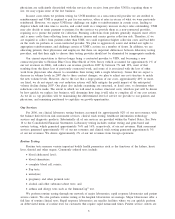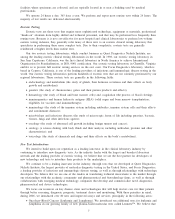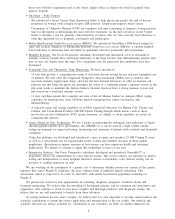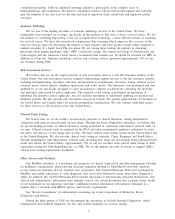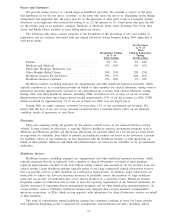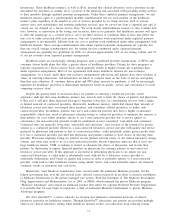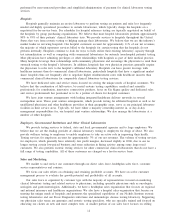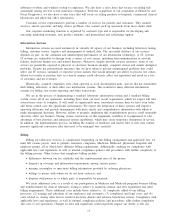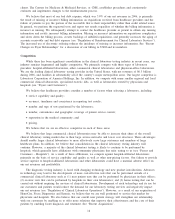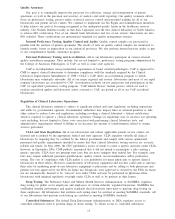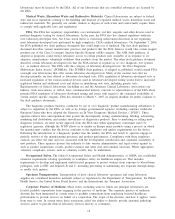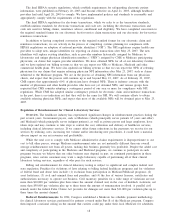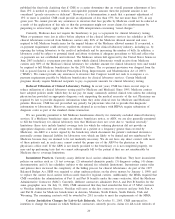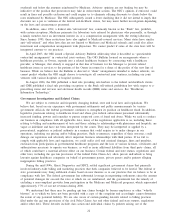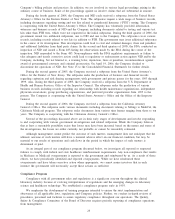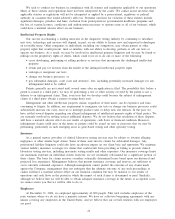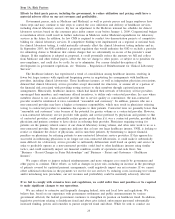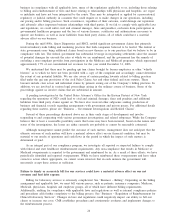Quest Diagnostics 2006 Annual Report Download - page 37
Download and view the complete annual report
Please find page 37 of the 2006 Quest Diagnostics annual report below. You can navigate through the pages in the report by either clicking on the pages listed below, or by using the keyword search tool below to find specific information within the annual report.laboratories must be licensed by the DEA. All of our laboratories that use controlled substances are licensed by
the DEA.
Medical Waste, Hazardous Waste and Radioactive Materials. Clinical laboratories are subject to federal,
state and local regulations relating to the handling and disposal of regulated medical waste, hazardous waste and
radioactive materials. We generally use outside vendors to dispose of such waste and contractually require them
to comply with applicable laws and regulations.
FDA. The FDA has regulatory responsibility over instruments, test kits, reagents and other devices used to
perform diagnostic testing by clinical laboratories. In the past, the FDA also has claimed regulatory authority
over laboratory-developed tests, but it has stated that it is exercising enforcement discretion in not regulating
most laboratory-developed tests performed by high complexity CLIA-certified laboratories. On September 7, 2006,
the FDA published two draft guidance documents that could impact us if finalized. The first draft guidance
document describes various manufacturer practices and products that the FDA believes would take certain reagent
products out of the Class I (exempt) Analyte Specific Reagent (ASR) category. The ASR draft guidance, if
adopted as proposed, could restrict laboratory access to certain products now available, if in response to its
adoption, manufacturers voluntarily withdraw their products from the market. The other draft guidance document
describes certain laboratory-developed tests that the FDA intends to regulate as in vitro diagnostic test systems
(i.e., as medical devices). The FDA calls this category of laboratory-developed tests “In Vitro Diagnostic
Multivariate Index Assays” (IVDMIAs). The IVDMIA draft guidance, if adopted as published, would extend FDA
oversight over laboratories that offer certain laboratory-developed tests. Many of the esoteric tests that we
develop internally are first offered as laboratory-developed tests. FDA regulation of laboratory-developed tests or
increased regulation of the various medical devices used in laboratory-developed testing would lead to increased
regulatory burden and additional costs and delays in introducing new tests, including genetic tests.
Representatives of clinical laboratories (including us) and the American Clinical Laboratory Association (our
industry trade association), or ACLA, have communicated industry concerns to representatives of the FDA about
potential FDA regulation of laboratory-developed testing and issues with regard to the continued availability of
certain analyte specific reagents. FDA has extended to March 5, 2007 its original deadline for public response to
the draft guidance documents.
The diagnostic products business conducted by our in vitro diagnostic product manufacturing subsidiaries is
subject to regulation by the FDA, as well as by foreign governmental agencies, including countries within the
European Union who have adopted the Directive on In Vitro Diagnostic Medical Devices (“IVDD”). These
agencies enforce laws and regulations that govern the development, testing, manufacturing, labeling, advertising,
marketing and distribution, and market surveillance of diagnostics products. Prior to marketing or selling most
diagnostic products, we must secure approval from the FDA and (when appropriate) counterpart non-U.S.
regulatory agencies, although the IVDD allows us to market in Europe many products using a process in which
the manufacturer certifies that the device conforms to the regulatory and quality requirements for the device.
Following the introduction of a diagnostic product into the market, the FDA and non-U.S. agencies engage in
periodic reviews of the manufacturing processes and product performance. Compliance with these regulatory
controls can affect the time and cost associated with the development, introduction and continued availability of
new products. These agencies possess the authority to take various administrative and legal actions against us,
such as product suspensions, recalls, product seizures and other civil and criminal sanctions. Where appropriate,
voluntary compliance actions, such as voluntary recalls, may be undertaken.
Occupational Safety. The federal Occupational Safety and Health Administration, or OSHA, has established
extensive requirements relating specifically to workplace safety for healthcare employers. This includes
requirements to develop and implement multi-faceted programs to protect workers from exposure to blood-borne
pathogens, such as HIV and hepatitis B and C, including preventing or minimizing any exposure through sharps
or needle stick injuries.
Specimen Transportation. Transportation of most clinical laboratory specimens and some laboratory
supplies are considered hazardous materials subject to regulation by the Department of Transportation, the Public
Health Service, the United States Postal Service and the International Air Transport Association.
Corporate Practice of Medicine. Many states, including some in which our principal laboratories are
located, prohibit corporations from engaging in the practice of medicine. The corporate practice of medicine
doctrine has been interpreted in certain states to prohibit corporations from employing licensed healthcare
professionals to provide services on behalf of a corporation. The scope of the doctrine, and how it applies, varies
from state to state. In certain states these restrictions affect our ability to directly provide anatomic pathology
services and/or to provide clinical laboratory services directly to consumers.
16


